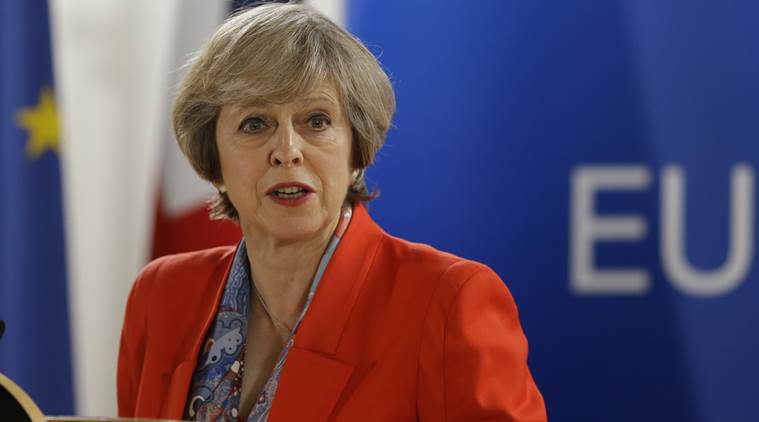United Kingdom 2019: What if Brexit proved to be a success story?
So far, the media and political
analysts have been unanimous: Brexit represents an uncertain and dangerous
future only for the UK. Our readers know that we have always been more
circumspect about this. Now that the first phase of negotiations has been
completed (at the end of last year) and the second phase is about to start, it
is time to admit that this exit from the EU also opens up many opportunities
for the UK and that it creates new risks for the EU. Within this second phase
of negotiations, which will focus on the transition period and the future
relationship between the two parties, the balance of power could indeed
reverse.
The British government, criticised for lack of clarity and realism since the beginning, clarified a number of points through Theresa May on 2nd March and set out a concrete exit plan... (GEAB 123 - Read the public announcement)
The British government, criticised for lack of clarity and realism since the beginning, clarified a number of points through Theresa May on 2nd March and set out a concrete exit plan... (GEAB 123 - Read the public announcement)
 Europe
2018: The EU unplugged
Europe
2018: The EU unpluggedWe have been anticipating for many months a political takeover by the national level all over the world. This takeover has emerged as a necessity linked to the structural incapacity of supranational levels of governance (patiently put in place during the second half of the twentieth century) to trigger the reforms imposed by the huge global geopolitical reconfiguration and societal transformation brought about by the Internet. If, on the contrary, these supranational levels mainly served as shackles and contributed to aggravate the problems rather than solve them, this is due to their illegitimacy in governing. In a world where democratic mechanisms, armies and security forces represent the prerogative of national levels, the top of the governance edifice remains the national level; a national level which is nevertheless embroiled in a mesh of transnational agreements based on a principle of mistrust of politics, which led, consensually, at the end of the twentieth century, to a relative disappearance of politics in favour of whole-economics... (GEAB 123 / Register here)
 Towards
a major crisis of the Brussels system
Towards
a major crisis of the Brussels system A very strong indicator of the European Commission's deactivation procedure comes out of the impressive series of mini-scandals currently exploding around this institution. We are paying particular attention to this because it is an anticipation we have had in mind for a few months – a repeat of the Santer Commission scandal (another Luxembourgeois...) which occurred in 1999. Since last September, no less than five mini-scandals have made the news (or resurfaced), in connection with President Juncker, former President Barroso, two European Commissioners, Kroes and Avramopoulos, as well as Juncker's main adviser, Selmayr, who miraculously became Secretary-General of the Commission (the most powerful job in the entire structure) on an ultra-federalist agenda (even if tainted with democratism). With regard to the Selmayr case, the media already use the term ‘Selmayrgate’... (GEAB 123 / Register here)
 Theresa
May closes ranks
Theresa
May closes ranksA first sign of the significant change in the balance of negotiating powers is the cordial, even warm, reception reserved for Theresa May's speech on 2nd March at Mansion House. Nevertheless, the Prime Minister has been perceived as being in particular difficulty since the June 2017 elections. We had anticipated her resignation before the end of 2017. The fact is that last December was particularly harsh for her. But she resisted and seems in better shape now, revealing that she also has some powerful support. Even the Guardian, which is far from favourable to her, has picked up the positive reaction from the Conservative ranks to the speech of their chief commander. The author even admits that conjecture about backtracking and organising a new referendum with the implicit goal of cancelling that of 2016, has fallen flat for the moment... (GEAB 123 / Register here)
 Back
to the Commonwealth alongside a deep trade partnership with the EU
Back
to the Commonwealth alongside a deep trade partnership with the EU An abandonment of this regulation and an emancipation of the Brussels' tutelage still remain largely probable, because although a trade partnership following Brexit goes without saying, it is far from guaranteed that it will cover financial services as well. The speech on 2nd March has definitely clarified a point that Theresa May had announced widely; the future Euro-British relationship will be framed by a free trade agreement. What seems very likely, if not accepted, is that this agreement will guarantee trade in goods that is free of tariff barriers and quotas, since this objective is shared by both negotiating parties. For Europeans, this point seems obvious since the trade balance of goods is largely to the advantage of the continent. For the British, this will allow them to limit the cost of their imports... (GEAB 123 / Register here)
 Making
the UK a hub for international trade
Making
the UK a hub for international tradeBeyond the Commonwealth, emerging markets show real opportunities in the services sector. As Simon Evenett explains, demand for services is growing faster than wages, ‘so continued growth in emerging markets should be a significant business opportunity for UK services providers. This is especially true for high-end services.’ And many of these emerging markets use the UK legal system, so the UK can easily establish or develop a special relationship with them. The independence of its trade policy and the fact of not having to take into account the interests of 27 other members in a negotiation or even in the setting of objectives in market prospects, will allow it to advance more quickly and with greater flexibility...(GEAB 123 / Register here)
 2018
Multipolar globalisation: EU adopts the pro-trade protectionist model
2018
Multipolar globalisation: EU adopts the pro-trade protectionist modelAs we all know, Donald Trump kicked off the reinvention of trade relationships by imposing customs barriers on steel and aluminium. In addition to the duty of protecting this industry and the jobs connected with it, he was motivated by the strategic nature of this sector which is intrinsically linked to the army. Economy, employment, National Security. This is clearly about national sovereignty. Hence, logic and supranational bodies are again undermined (particularly the WTO and the EU)... (GEAB 123 / Register here)
 New
Finance: Eyes on ICOs
New
Finance: Eyes on ICOsIn the next five years, the ICO (Initial Coin Offering), which currently looks like a micro-phenomenon in the sphere of fundraising, will be an essential means for structuring a company on a sustainable basis. Halfway between crowdfunding and traditional fundraising IPO (Initial Public Offering), ICO is a new tool allowing companies to deploy a new growth model based on the issuance of tokens against crypto-currencies instead of other traditional operations. The implementation of ICO therefore has no impact on the distribution of any company's capital... (GEAB 123 / Register here)
Oil
Anticipation: 20th May 2018 – Venezuela's comeback and an oil price decrease
No one needs expensive oil and we anticipate that oil prices are about to drop significantly and sustainably in the coming months. Read on for the reasons behind this anticipation. Since the main topic of this GEAB number is the dissolving of supranational systems, we will start with the anticipation that OPEC will cease to exist by the end of 2018. We have always said that the production reduction agreements of OPEC were the only reason why oil prices had gone up. Now we believe that OPEC played its role at the appropriate time, but times are changing now. OPEC itself is declaring a return to market stability by the end of 2018, marking a real success in its efforts to reduce the supply surplus...(GEAB 123 / Register here)
No one needs expensive oil and we anticipate that oil prices are about to drop significantly and sustainably in the coming months. Read on for the reasons behind this anticipation. Since the main topic of this GEAB number is the dissolving of supranational systems, we will start with the anticipation that OPEC will cease to exist by the end of 2018. We have always said that the production reduction agreements of OPEC were the only reason why oil prices had gone up. Now we believe that OPEC played its role at the appropriate time, but times are changing now. OPEC itself is declaring a return to market stability by the end of 2018, marking a real success in its efforts to reduce the supply surplus...(GEAB 123 / Register here)
European
arms industry: All the way, with military QE ahead
If it is true that the North American defence sector is a treasure-trove of high-potential stock securities, and that Russia is also not to be ignored as it demonstrates its military resources, we must also closely monitor the defence sector in Europe. Military Quantitative Easing is playing hard and defence investment is increasing in most European states , boosted by the work of member states to move forward in new military cooperation. It is indeed a refocusing by the European states around Permanent Structured Defence Cooperation (PESCO), promoting the development of an independent European arms industry in relation to the transatlantic axis, which signed of on the act and the first 17 collaborative projects on 6 March, 2018... (GEAB 123 / Register here)
If it is true that the North American defence sector is a treasure-trove of high-potential stock securities, and that Russia is also not to be ignored as it demonstrates its military resources, we must also closely monitor the defence sector in Europe. Military Quantitative Easing is playing hard and defence investment is increasing in most European states , boosted by the work of member states to move forward in new military cooperation. It is indeed a refocusing by the European states around Permanent Structured Defence Cooperation (PESCO), promoting the development of an independent European arms industry in relation to the transatlantic axis, which signed of on the act and the first 17 collaborative projects on 6 March, 2018... (GEAB 123 / Register here)













No hay comentarios:
Publicar un comentario
Se permiten solo aquellos comentarios que no sean ofensivos en su forma o su contenido, debiendo ser expresados en cualquier caso, con respeto a las personas e instituciones.